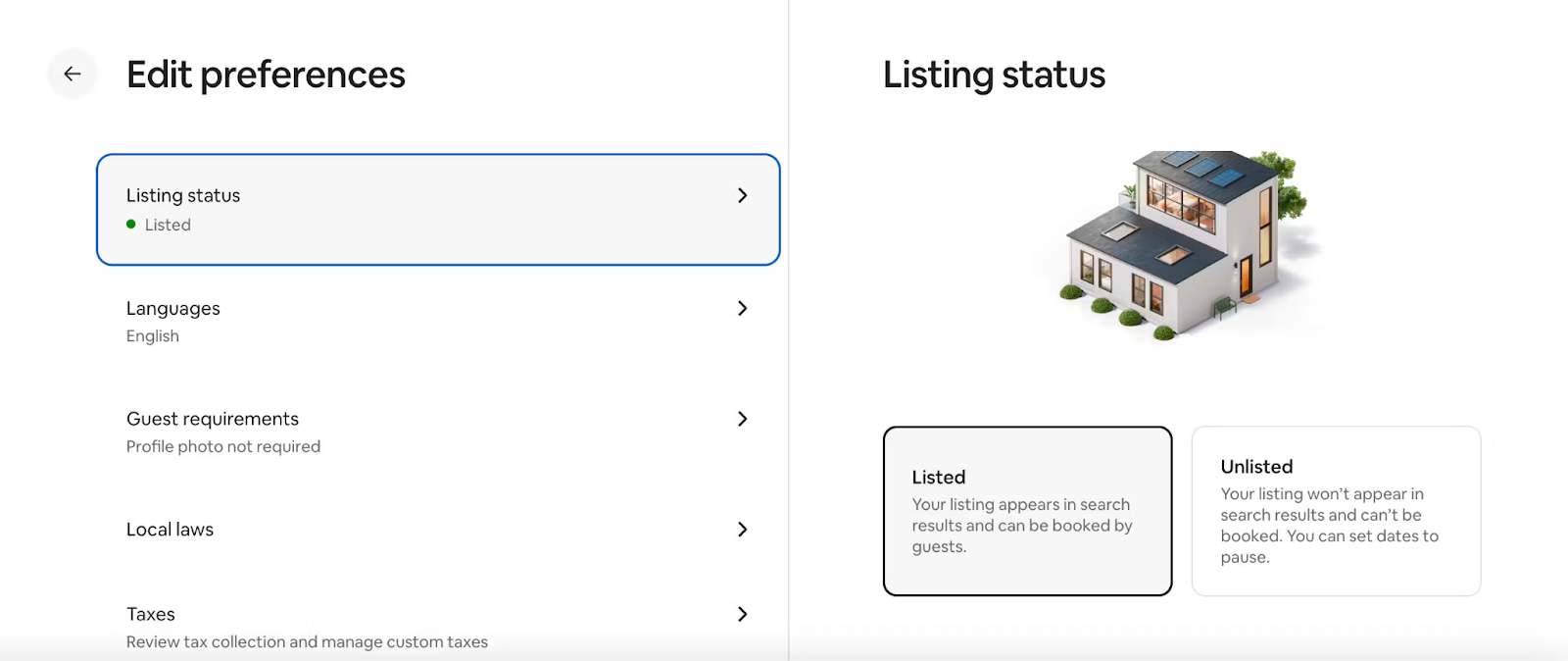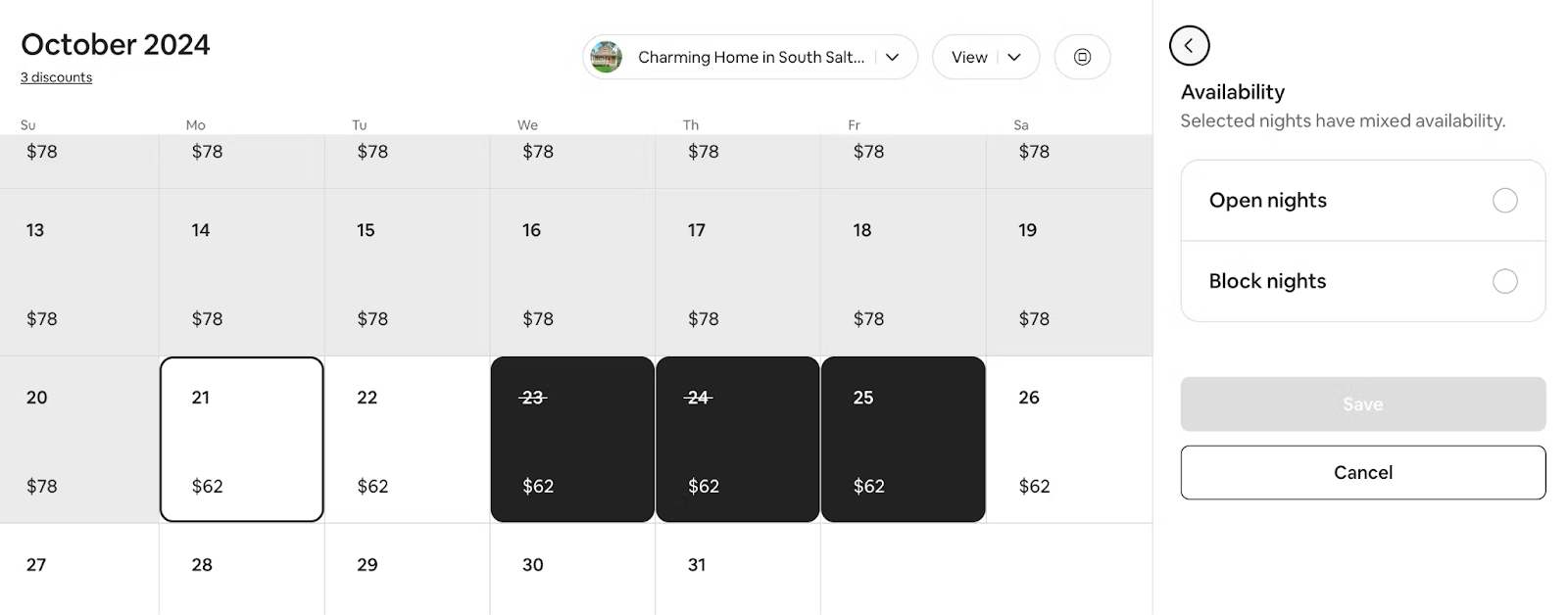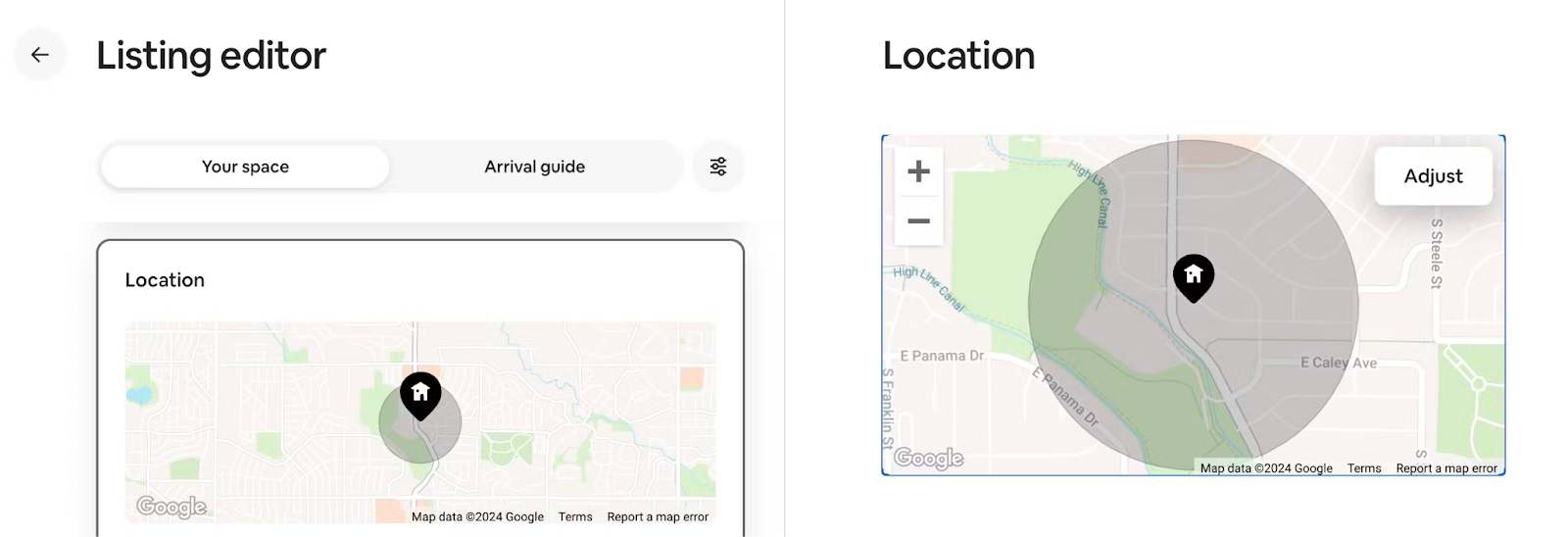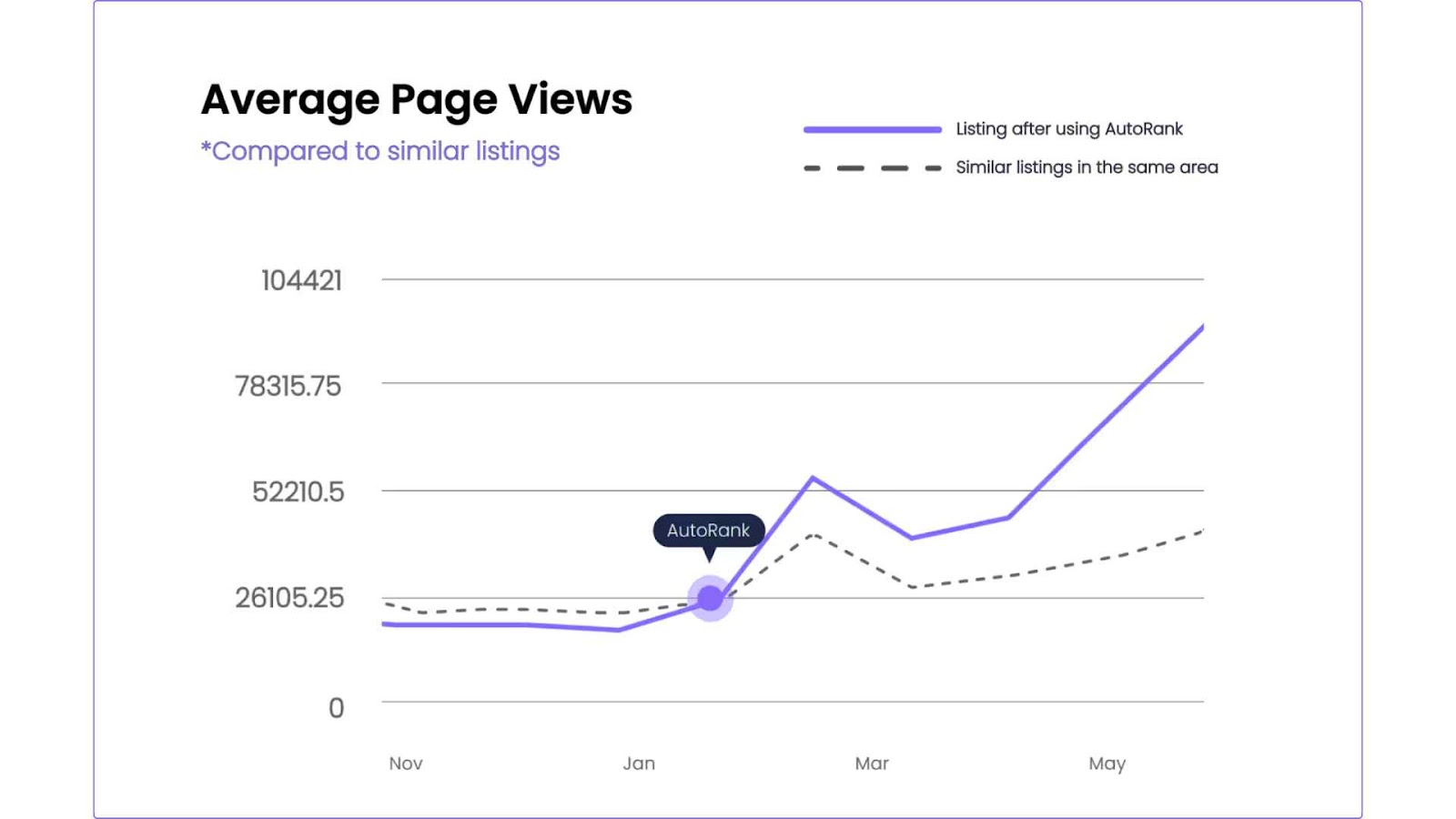You’ve done everything right, great property, beautiful photos, perfect description, strong title, but the bookings stopped coming. A sinking feeling creeps in: “Is my property hidden by Airbnb?”
Invisibility on Airbnb leads to a vicious cycle: no bookings, which drives less views, which drives lower rankings.
Your listing gets trapped in a digital black hole by algorithmic penalties that punish inactive properties.
But you can escape. This blog will show you why your listing is hidden and provide the action plan to get it back in front of guests.
How to check if you're listing is truly hidden on Airbnb
We created a detailed checklist for you to check the visibility of your listing and to fix a hidden listing, you can download it for free here.
Before you go down a rabbit hole of troubleshooting, you need to confirm if your listing is actually invisible. Your view as a host is different from a guest's. Here is the single best way to check your real-world visibility.
The incognito window test
This is the most crucial step. You must perform this test in an "Incognito" or "Private" browser window. Why? Because Airbnb personalizes search results based on your cookies and search history. Searching in a normal window will give you skewed, inaccurate results. An incognito window shows you what a brand-new potential guest sees.
- Open a new incognito/private window: In Chrome, it's Ctrl+Shift+N. In Firefox or Safari, it's Ctrl+Shift+P.
- Go to Airbnb.com: Do not log in.
- Enter your search criteria:
- Location: Be specific to your city and even neighborhood.
- Dates: This is critical. Search for dates that you know are open and available on your calendar. If you search for blocked dates, your listing will not appear. If you have minimum length of stay restrictions, make sure to take those into account as well, as they can prevent your listing from appearing in certain search results.
- Number of Guests: Enter a guest count that your property can accommodate.
- Click search and start looking. Scroll through the first several pages of results. If your market is competitive, you may need to go deep.
What did you find?
- You found your listing: Great! Your property isn't technically hidden. It might just be ranking lower than you'd like. The rest of this guide is still essential for you, it will teach you how to climb those rankings and gain the momentum needed to land on the first page. go to ‘Step 2: Master the algorithm with deep optimization’ for more information.
- You can't find your listing at all: If you've scrolled through all 300 listings and your property is nowhere to be found (and you've double-checked your search dates), then you have a problem. Your listing is indeed hidden by Airbnb, likely due to a technical issue or a severe algorithmic penalty. Continue to Part 1 to diagnose why.
Part 1: Diagnosing the problem - why your listing is invisible
Once you've confirmed your listing is hidden or ranking poorly, you can diagnose the cause. A listing can be hidden by Airbnb for a handful of reasons, ranging from simple technical settings to the complex and punishing behavior of the platform’s algorithm.
Reason 1: Technical status and processing delays (the easy fixes)
Sometimes, the reason your listing isn't showing up is a straightforward technical one. Let's cover the most common culprits first.
Processing delays for new listings
If you've just created your listing, a bit of patience is required. One of the most common reasons a brand-new listing doesn't appear is that it’s still in Airbnb’s internal verification queue. When you publish, Airbnb reviews the listing to ensure it's legitimate and complete. This process typically takes up to 72 hours. During this period, your listing won’t appear in search results, even though it may look live on your host dashboard.
- What hosts can do in the meantime: Don't just wait. Use this time productively. Triple-check every section of your listing. Review your property details, amenities, house rules, and pricing to ensure everything is perfect. A complete and accurate listing can help expedite the verification and set you up for success the moment you go live. Check out our Airbnb ranking checklist to make sure your listing is complete.
Accidental invisibility: listing status issues
A more common and easily fixed issue is an incorrect listing status. You might have accidentally set your listing to "Snoozed" or "Unlisted." This can happen after making edits or if there's a minor error in your account settings.

Here’s how to check and fix this:
- Log in to your Airbnb account.
- Navigate to your Listings dashboard from the top menu.
- Under “Your listings,” look at the thumbnail for your property. In the upper-left corner, you will see its status: a green dot for “Listed” or a gray dot for “Unlisted.”
- If it's "Unlisted," you need to reactivate it. Click on the listing, and in the "Listing editor," select the hamburger menu (three horizontal lines) to the right of “Arrival guide.”
- In the "Edit preferences" menu, choose “Listing status.”
- Here, you can make your Airbnb active by selecting “Listed.”
Understanding the difference between these statuses is crucial for effective property management.
- How do I unlist on Airbnb? Unlisting your property removes it from search results indefinitely. This is the right choice if you're taking it off the market for an extended period or selling it. However, unlisting does not block your calendar or cancel existing reservations, so you must manage those separately.
- How to snooze listing on Airbnb: Snoozing is a temporary deactivation. You choose a specific start and end date, and your listing is hidden from search results during that time. This is the perfect tool for when you want to use the property yourself, perform maintenance, or simply take a break from hosting without losing your listing's valuable momentum.
- How to change unlisted to listed on Airbnb: To reverse an unlisted status, simply follow the steps above. Navigate to the listing status editor and switch it back to “Listed.” It’s a simple click that can solve your visibility problem instantly.
Reason 2: The crushing weight of competition
In many popular markets, visibility is a zero-sum game. Airbnb only displays a maximum of 270 listings per search result page. If you're in a highly competitive area, your property might be technically active but buried after page 15, where no guest will ever find it.
This is especially true for listings with no reviews or properties that are priced higher than the market average. This is a common scenario where a listing is effectively hidden by Airbnb’s ranking algorithm, even if there are no technical issues. To learn how to rank higher and actually become visible on Airbnb, go to ‘Step 2: Master the algorithm with deep optimization’.
Reason 3: The hidden danger of “dead listings” and why momentum is everything
This is the most critical, insidious, and financially damaging reason a property becomes hidden by Airbnb. It’s not a technical error or simple competition; it's a direct algorithmic penalty for a lack of momentum. And it’s a trap that many well-intentioned owners fall into.
The momentum trap: how rigid rules make you invisible
Many hosts set rigid pricing and booking rules believing they’re protecting their property’s value. A booking below the “ideal” rate feels like a loss. But in today’s competitive landscape, these restrictions are often the fastest way to become invisible on Airbnb.
Common pitfalls include:
- Setting high minimum rates and refusing to lower them during slower periods or shoulder seasons. This blocks momentum and hurts your chances of being shown in search.
- Enforcing long minimum stays (e.g. 7+ nights), which severely limits visibility for short-stay searches, especially weekend getaways, which are some of the most popular booking patterns. Airbnb’s algorithm favors listings that appear in more searches (R&A = “Results & Availability”), so by limiting stay length, you're actively reducing your exposure.
- Not adjusting pricing dynamically for weekdays, seasonality, events, or shifting demand. This creates one of two problems:
- Overpacing – You get booked too quickly, often at suboptimal prices, leaving money on the table and potentially missing out on longer or higher-value bookings.
- Underpacing – You don’t get booked at all because your pricing is out of sync with the market, and the algorithm penalizes you for a lack of conversions.
These restrictions don’t preserve value, they destroy it. The real cost isn’t the slightly lower rate you avoided. It’s the algorithmic penalty that makes your listing invisible to guests.
Why the algorithm punishes inactivity
Airbnb’s algorithm is designed to maximize the probability that a guest has a good stay, because good stays lead to good reviews. And good reviews drive trust and more bookings.
That’s why the algorithm favors listings that are likely to get booked and deliver consistently positive experiences.
If your listing goes just three to six weeks without a booking, the system reads this as a clear signal: there’s no demand for this property under current conditions. Whether due to inflexible pricing, uncompetitive minimum stays, or lack of updates, the algorithm assumes your listing is undesirable.
The result? A silent but sharp drop in visibility. Your property slips down the rankings, buried beneath listings that are converting, even if those other listings have lower rates or shorter stays.
This is the momentum trap: once the algorithm stops believing in your listing, it takes serious effort to recover.
The high cost of recovery from the 'dead zone'
Once you fall into this "dead zone," recovery is an expensive and stressful uphill battle. It’s no longer about getting your ideal rate; it’s about clawing your way back to visibility. This often requires painful and costly actions, like steep discounts and dropping all your restrictions, together with implementing the most flexible cancellation policies.
The strategic power of a booking, any booking
The logic of the algorithm is so relentless that in extreme cases, it might even be more cost-effective to rent out a few nights almost for free rather than letting the property sit empty for too long. Why? Because the algorithm values a booking, any booking, as a powerful signal of demand.
Keeping bookings flowing, even at minimal or no profit, sends these critical signals to the platform’s algorithm, telling it your property is relevant and in demand. Your visibility in low season will also determine your visibility in high season, as the algorithm rewards consistent demand over time. This proactive approach is a strategic defense that can maintain your listing’s visibility and prevent the far greater revenue loss that comes with being hidden by Airbnb in the algorithmic dead zone.
Part 2: The action plan - your troubleshooting steps to get visible
If your listing isn’t showing up and you suspect you're losing momentum, it’s time to take control. This troubleshooting process will address the key factors that influence your ranking and help you build the momentum needed to stay visible.
Step 1: Conduct a foundational audit
Your booking settings and calendar availability are the bedrock of your visibility and momentum.
Ensure your calendar is open and accurate
Your listing’s visibility is directly tied to your availability. If a guest is searching for dates that are blocked on your calendar, you simply won't appear.

- Log in to your Airbnb host account and navigate to your Calendar.
- Visually scan for any unintentional blocked nights. These will appear as a solid color (often gray or black) with a slash through the date.
- To make a blocked date available, select the date (or a range of dates) and click on “Edit availability.”
- Choose “Open nights” and click save.
An up-to-date calendar does more than just open dates; it signals to Airbnb that you are an active and engaged host, a crucial factor for maintaining booking momentum.
Re-evaluate your minimum stay requirements
Strict minimum stay requirements are a primary way that hosts inadvertently kill their own momentum. If your listing requires a minimum stay of five nights, you are invisible to the huge pool of guests searching for a three or four-night stay, preventing the very bookings you need to stay relevant to the algorithm.
Assess whether your minimum stay is too long and compare what is the minimum-length of stay for other listings in your region. Consider a flexible two-night minimum, especially during the off-season or for midweek gaps, to capture more bookings and continuously signal demand to Airbnb. For more information on MinLOS, go to this blog.
Optimize your location accuracy and map placement
Guests rely on the map to understand a property's proximity to attractions. An inaccurate pin can cause them to skip over your listing.

- Navigate to your Listings page.
- Select your listing and scroll down to the “Location” section in the Listing editor.
- Click the “Adjust” button on the map.
- Carefully move the pin to reflect your property's precise location and click “Save.” An accurate pin ensures you appear in geographically specific searches.
Step 2: Master the algorithm with deep optimization
Think of optimization as feeding the algorithm exactly what it wants: signals of a desirable, bookable property.
Optimize with Airbnb filters in mind
Every filter a guest applies is a chance for your listing to be excluded. Your job is to appear in as many relevant filtered searches as possible.
- Guest capacity and accommodation type: This is basic but critical. Ensure your listing accurately reflects the accommodation type (e.g., entire place), guest capacity, and number of bedrooms and beds.
- Amenities are your secret weapon: Go through the amenities list with a fine-tooth comb. Check off everything you offer. "Hot tub," "Pet-friendly," and "EV charger" are powerful filters, but so are "Dedicated workspace," "Self check-in," and specific kitchen items.
Activate instant book to boost visibility
Instant Book is a direct line to the algorithm's good side. It allows guests who meet your requirements to book without manual approval, guaranteeing a perfect response rate. The algorithm rewards this reliability with better search placement.
If you're hesitant, remember you can set guest requirements, such as needing positive reviews from other hosts or a verified ID, giving you control while still reaping the visibility benefits.
Stay aligned with current guest search behavior
Relying on a one-time optimization is no longer enough. Airbnb’s algorithm favors listings that remain relevant to current guest searches, both in high and low seasons. By updating your titles, descriptions, and keyword usage every week with the most searched, trending terms in your market, These updates also reflect local events, seasonal demand, and emerging traveler preferences, ensuring your listing stays competitive year-round. Luckily there are tools to do this for you automatically.
Use Airbnb’s search filters to check your own visibility
Don't just guess if you're visible. Test it. Open an incognito browser window (so your history doesn't influence results) and search as a guest would. For example, search for a 2-bedroom in your area with a hot tub on dates you have open. If you don’t appear, you have an optimization and momentum problem to solve.
Step 3: Create 5-star experiences to fuel momentum
Ultimately, the best way to avoid being hidden by Airbnb is to be a fantastic host.
Creating 5-star guest experiences is the engine of your business and the ultimate source of momentum. Great service leads to great reviews, and great reviews are the most powerful signal of a high-quality listing. A steady stream of positive reviews tells the algorithm that your property is a safe bet, leading to higher rankings and more visibility. Responding quickly to messages, maintaining a clean and well-stocked property, and being a helpful resource for guests are not just good hospitality, they are core business strategies for long-term visibility.
Case study: Casago’s remarkable 66% increase in listing views
Casago Property Management, a highly-rated company with a portfolio of five-star properties, still experienced the core problem: poor visibility on Airbnb searches. Even with exceptional service, their listings weren't getting the attention they deserved in a competitive market, threatening their owners' revenue.
The solution
To boost their positioning, Casago teamed up with AutoRank. The AI-powered solution continuously analyzes guest search behavior, trending keywords, and Airbnb’s ranking parameters. It then identifies and automatically updates Casago's listings with the most effective titles and descriptions every 48 hours, ensuring they are always optimized for maximum visibility.
The results
The results from the partnership, speak for themselves.

- Over the next 6 months, Casago saw an average increase of 66% in year-over-year listing views.
- Casago outperformed their Airbnb comp set by a total average of 94%, going from 34% below the competition to 67% above the competition after launching AutoRank.
The partnership highlights the massive impact of leveraging AI to boost visibility. It proves the old adage: “being seen is the first step to being booked.” An unofficial airbnb shut down caused by algorithmic invisibility is a real threat to your bottom line. Protecting your investment means being proactive and adaptive. As Casago’s story shows, the right technology can turn the tide from being hidden to being a market leader.
The ultimate consequence: the unofficial airbnb shut down
What happens if you ignore all this? If you let your listing stagnate with rigid rules, poor optimization, and slow response times? Your property will sink so deep into the search rankings that it becomes practically nonexistent. This is, for all intents and purposes, an unofficial airbnb shut down.
Protecting your investment means being proactive and adaptive. You cannot afford to let your property fall into the dead zone. For busy property managers juggling an entire portfolio, consistently applying these deep optimization strategies is a monumental task. Staying on top of dynamic pricing, guest communication, and calendar updates is a full-time job. This is where a powerful, automated platform like AutoRank can become an indispensable partner, ensuring your properties achieve and maintain the critical booking momentum they need to thrive.
Frequently asked questions (FAQ)
Why is my property hidden by Airbnb?
Your property might be hidden by Airbnb for technical reasons like an "Unlisted" status, but more often it's due to algorithmic penalties. The main cause is a loss of booking momentum, where a lack of recent bookings signals to Airbnb that your property is not in demand, causing it to be pushed down in search results.
How can I fix a listing that's hidden by Airbnb?
First, fix any technical issues like your listing status. Then, focus on regaining momentum. Enable Instant Book, adopt a flexible minimum stay policy, use dynamic pricing to capture bookings, and improve your photos and description. The goal is to get bookings flowing again to signal demand to the algorithm.
What's the difference between 'how to snooze listing on airbnb' and 'how do I unlist on Airbnb'?
How to snooze listing on Airbnb temporarily hides your listing for a specific period, which is useful for short breaks without losing all your momentum. How do I unlist on Airbnb is a long-term action that removes it from search indefinitely, which should be used with caution as it completely halts your listing's activity.
How do I change my listing from unlisted to listed on Airbnb?
To fix this, you need to know how to change unlisted to listed on Airbnb. Go to your host dashboard, select "Listings," click the property, find the "Listing status" editor, and switch the setting from "Unlisted" back to "Listed."
Could my business face an 'airbnb shut down' if my listing is always hidden?
Yes, financially. While a formal airbnb shut down is for rule-breaking, a listing that is perpetually hidden by Airbnb due to being in the "dead zone" generates no income. This algorithmic invisibility is an effective airbnb shut down for your revenue.
AutoRank is an AI-driven listing optimization tool that helps short-term rental hosts and property managers optimize Airbnb listings for maximum visibility and bookings in top markets across the U.S., South-America, Europe and the U.K.


.jpg)